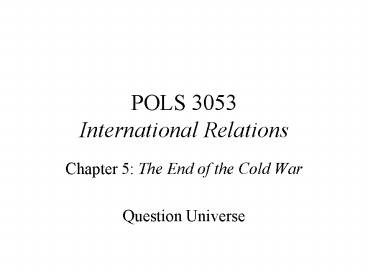POLS 3053 International Relations
1 / 19
Title:
POLS 3053 International Relations
Description:
POLS 3053. International Relations. Chapter 5: The End of the Cold War. Question Universe ... b. Armenia. c. the Baltic republics. d. Ukraine. e. Azerbaijan. ... –
Number of Views:48
Avg rating:3.0/5.0
Title: POLS 3053 International Relations
1
POLS 3053International Relations
- Chapter 5 The End of the Cold War
- Question Universe
2
The ascension of __ to the General Secretary
position of the Soviet Communist Party in 1985
had far-reaching significance.
- a. Leonid Brezhnev
- b. Konstantin Chernenko
- c. Yuri Andropov
- d. Boris Yeltsin
- e. Mikail Gorbachev
3
The basic meaning of the term perestroika is
- a. renewal. d. restructuring.
- b. revenge. e. openness.
- c. retrenchment.
4
The basic meaning of the term glasnost is
- a. openness. d. free love.
- b. restructuring. e. tolerance.
- c. renewal.
5
Following the Soviet elections of __, the
political system was transformed by the entry
into public life of a mass of new participants, a
large proportion of whom were not beholden to the
Communist Party.
- a. 1987 d. 1990
- b. 1988 e. 1991
- c. 1989
6
The first region of the Soviet empire to demand
independence was/were __, which quickly rippled
throughout the Soviet republics.
- a. the Muslim republics of Central Asia.
- b. Armenia.
- c. the Baltic republics.
- d. Ukraine.
- e. Azerbaijan.
7
The effect of Russian economic reforms was
- a. salutary. d. mixed.
- b. catastrophic. e. generally favorable.
- c. miraculous.
8
The collapse of communism in Eastern Europe,
marked most graphically by the destruction of the
__ in November 1989, was intimately related to
events in the Soviet Union but also had roots of
its own.
- a. Gulag Archipelago d. Chernobyl
- b. Great Wall of China e. all of the above
- c. Lenins Statue in
- Leningrad
9
In accounting for the events that led to the
overthrow of communism in Eastern Europe, it
would be hard to overestimate the importance of
the rise of __ in Poland in 1980.
- a. Pravda d. the Christian Democrats
- b. Charter 77 e. the Prague Spring
- c. Solidarity
10
The one violent event that marked the climax of
the revolutions in Eastern Europe occurred in
Romania, where __ was overthrown and executed.
- a. Nikolaou Ceausescu d. Janos Kadar
- b. Andre Codrescu e. Erich Honecker
- c. Boris Karlov
11
In Czechoslovakia, in the face of massive popular
protest, the government fell in November and __,
playwright and dissident, was elected President.
- a. Boris Yeltsin d. Alexander Dubcek
- b. Vladimir Putin e. Milan Kundera
- c. Václav Havel
12
American conservatives argue that the tough
stance of the __ administration, especially his
refusal to compromise on the development of the
Strategic Defense Initiative (SDI), had been
decisive in bringing about the fall of communism.
- a. Eisenhower d. Clinton
- b. Reagan e. Nixon
- c. G.H.W. Bush
13
Relations between the US and USSR did not
immediately thaw with the rise of Gorbachev.
G.H.W. Bushs Secretary of Defense __, noted in
1989 that Gorbachev could easily be overthrown by
hardliners.
- a. Donald Rumsfeld d. Richard Cheney
- b. Richard Cohen e. Stansfield Turner
- c. Les Aspin
14
The period __ has often been described as the
second cold war.
- a. 1954-1960 d. 1986-1992
- b. 1964-1970 e. 1996-2002
- c. 1978-1984
15
The Soviets admitted failure in their occupation
of Afghanistan, and withdrew their troops in
- a. 1985 d. 1988
- b. 1986 e. 1989
- c. 1987
16
Ronald Reagans personal attitude toward nuclear
weapons is described in the text as one of
- a. intense affection. d. indifference.
- b. visceral hatred. e. mild discomfort.
- c. incomprehension.
17
Conservative hawks have difficulty reconciling
their account of Reagan as an uncompromising
anti-communist with a Reagan who came close at
the __ summit of 1986 to agreeing with Gorbachev
to the establishment of a nuclear-free world.
- a. Reykjavik d. Oslo
- b. Stockholm e. Warsaw
- c. Munich
18
According to the text, from the perspective of
the end of the cold war, the Wests anxiety in
the 1950s and early 1960s looks
- a. justified. d. stupid.
- b. insane. e. misplaced.
- c. ludicrous.
19
Among the perceived benefits of the end of the
cold war included
- a. the possibility that the UN could be used as a
genuine collective security organization. - b. an economic peace dividend for western
nations. - c. a Pax Americana of global peace dictated by
U.S. power. - d. a general reduction of the threat of nuclear
war. - e. all of the above.






























